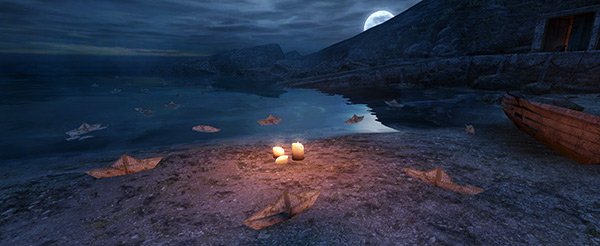What I Alternatively Think: Dear Esther
The colour purple
John’s already presented his verdict on thechineseroom’s first-person ghost-esque story Dear Esther, but I’ve a thing or two I’d like to say about it myself. And not just because I like to oppress John at any opportunity I get. It's because Dear Esther really did work its dark, metaphysical magic upon me.
This write-up will contain spoilers unbound; do not read on if you haven’t played (and intend to play) Dear Esther.
I played Dear Esther on my own in a dark room, headphones on, distractions banished, night outside, and subtitles resolutely turned off. I also had a glass of lovely beer to hand, but I’m less sure that’s relevant. The other stuff absolutely is: I found Dear Esther to be a broadly magnificent and genuinely moving experience, and that was almost entirely on a sensory level. Deciphering the plot – the nature of Esther and the narrator’s fate, who’s alive and who isn’t, how long you’ve been on this island, if you’re really still on this island at all, where the car crashed and what caused it to crash – simply isn’t of interest to me.
Not that it isn’t interesting, but I don’t see it as a puzzle to be pieced together. I do not believe Dear Esther is the search for an answer, or even for a meaning. I believe it is an experiment with the senses and the emotions. It is a Lonely, Guilt-Stricken Man Simulator. It is a journey through morbidly beautiful emptiness, a maudlin cocktail of sight, sound, implication and metaphor designed to conjure up a feeling of purposeful despair.
When you venture beneath the island's grassy surface and behold the luminescent, otherworldly beauty of the caves, it works not because it’s a pretty graphic but because of the startling juxtaposition with the clear sadness of the narrator’s/your situation. All this beauty, but it means nothing. You can’t do anything with it. There is no reason to. Your reasons for anything are gone. The bioluminescent rock formations glow softly and the skeletal piano music tinkles unseen ivories softly and, with my headphones on and my light turned off, my senses told me how I should feel. I was alone and besieged by powerful regret for undefined mistakes and losses, on a journey to a final destiny. To that dread red eye I could never escape, that would always be staring and beckoning. Once in a while, it was frustrating to be so crudely restrained from heading in the direction I wished to, but really, I only wished to go towards that awful light anyway.
My only interaction with this place was to look at it, to experience it. To react to what my own mind summoned in response, not to on-screen prompts or physical reflexes. Dear Esther is, in a very real sense, boring. It is supposed to be. Lonely tedium, that slow, slow walk through a stark land, leads to subconscious introspection. Ever walked along an empty beach at night? Sat alone on a hillside on a cold winter morning? Where did your mind go? Wherever it was, that’s where Dear Esther can take it. If you let it.
Of course I was being emotionally manipulated. But I was being manipulated with scalpel-sharp subtlety; implication, not the anvil to the face obviousness of watching a character die or choosing to save someone at the expense of someone else. Dear Esther doesn’t need to tell me anything, nor does it really attempt to in its fractured, contradictory lines of (occasionally over-florid) dialogue. Dear Esther only needs to make me feel something, and oh how it does. My situation, and the events that led to it, is self-evident enough through implication alone. One look at the washed-out hillside, the empty and devastated buildings and the harrowingly obvious lack of any other life whatsoever tells me almost all I need to know. Night slowly fell, and it fell with good reason.
When Dear Esther did try to say and do something directly – when it wrestled control away in the final minutes and forced a suicidal plunge upon me – it was weaker. It was no longer a sad, ambling voyage through sight and sound and broken memories, but instead a mandate. I don’t know why control was taken away.
I would have jumped anyway, once I reached the top of that mast. It would be the only sensible thing to do. The only right thing. I was alone. I was guilty. Whatever exploration of this island I could do was only ever delaying the inevitable. Why not let me wander it at my leisure, spend as long in this pretty purgatory as I needed to before I said my goodbyes to it, to the world, and to dear, unseen yet – I know, oh I know, oh so terribly important Esther?
Still, as my screen climbed me up that iron ladder, as it dropped my gaze to the rocky shore below, as grass fluttered softly in the breeze, as the candlelights at sea level twinkled, as the narrator uttered his regrets and his resolutions, my heart did soar in dark triumph. (Ach, who am I to accuse this game of excessively purple prose?) Esther. I never knew her, but I knew Esther was every mistake I'd ever made. Goodbye, Esther. This was the only right thing to do, the only way for this to possibly end. The pixels on my screen moved, but I did not. But my mind was busy, creating a perfect image of myself, arms outstretched, diving, smiling, and then…
And then that was it. I do not understand why anyone would ever play through Dear Esther a second time. It ends. It is supposed to end. Why repeat something so final? The pursuit of different lines of dialogue, plucked at random from a small database of voice samples, seems futile to me. Perhaps there is one clear, true, absolute tale to be slowly pieced together, cutting through the contradictions, the confusion and the narrator’s insensible grief, but if there is I don’t wish to know it.
The meaning I created for myself, both early on and then again come the resolution, is more than that could ever be - yet it is nothing concrete or even describable. I feel a great swell of pity for people on Wikipedia, GameFaqs, forums et al who have attempted to clarify all, and indeed for anyone who rolled their eyes and thought ‘well, this is obvious’. They do that because they surely can’t have experienced the body-blows to the senses that I did.
Given I have no wish to play it again, nor do I understand why anyone else would, at $10 Dear Esther does seem, by standard metrics, too expensive for a mere 90 minutes or so of slow journey through a Hebridean island wilderness with only one possible outcome. Then again, the same money would buy me an hour and a half of going to watch a man dressed as a superhero punch some special effects. Why would I not pay the same for an hour and a half of admiring and wondering at stark beauty, and feeling dark corners of my brain whisper dark secrets about myself to me? I climbed that tower, I jumped from it, and I did soar.
Dear Esther is out now.






















